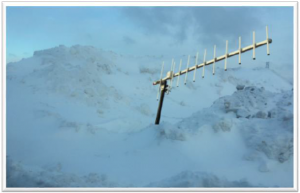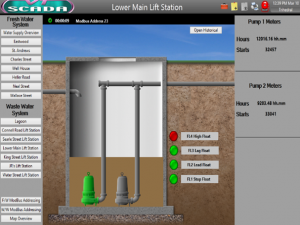The benefits and challenges of water/wastewater monitoring in winter.
A Profile of Woodstock, New Brunswick
Like many municipal water and wastewater utilities, the Town of Woodstock, New Brunswick, has seen its share of ice and snow. Over 30 years, the town has averaged 107.2 inches (272.20 cm) of snow a year with winter temperatures dropping as low as -14.8°F (-26°C). Cold climates can play havoc with distributed infrastructure like pumps, tanks, and valves and make it dangerous or impossible to access them. Supervisory Control and Data Acquisition (SCADA) systems unite remote equipment into a single interface that operators can manage without leaving the office. During winter months a SCADA system can help ensure service, reduce costs, and keep operators safe and warm. Below, integrator Michael Hickey of The Panel Shop describes the challenges involved in creating winter-proof SCADA applications like the one the team created for Woodstock using VTScada software from Trihedral.
The Town of Woodstock – Woodstock is located in the province of New Brunswick and is 25 km’s from the border of Maine. The Water and Sewer Departments provide year-round service to over 5,500 residents.
The Panel Shop – Michael Hickey is Senior Electrical Design Technologist with The Panel Shop, the Fredericton based integrator responsible for upgrading the utility’s SCADA system. “I started with them almost 19 years ago in the panel manufacturing shop. I moved up into design and for the last 14 years I have been working primarily with the municipal water and wastewater division.”
The New SCADA System – In 2012, the town decided to replace the non-functioning SCADA software system that they had once used to monitor and control one of their wells, two booster pumps, and three freshwater tanks. “It was an old system. There was no longer anyone to support it since their old integrator had left the area” says Hickey. This was one of the reasons that The Panel Shop chose to use VTScada from Trihedral as the software platform for the new system. “One of the features I used to convince the town to use this software was that we are not the only ones around who can support it. If something happened to us they could go to one of the other local integrators who use it or they could get in contact with Trihedral directly. It makes a huge difference to them, knowing that support is going to be there.”
Maintaining Value From the Legacy System – The software also allowed the utility to keep their existing network of Programmable Logic Controllers (PLCs) thanks to VTScada’s built-in library of device drivers. “What we did is put in the new SCADA system with its own radios so that it didn’t affect the existing system.” This significantly reduced the cost and integration time for the conversion project.
Communication Challenges – “Our biggest concern is that often we end up installing systems in the winter because of how municipal budgets work,” says Hickey. In addition to inconvenience of working in the cold, this also can have repercussions for things like radio networks. “Sometimes we have communication problems that pop up in the spring when leaves start coming in. We then have to go back out to make adjustments.” The integration team configured the built in alarms and trending tools to help operators identify when foliage begins to obstruct radio signals. “We monitor interruptions to the MODBUS connection for each location. We typically set a warning alarm at five minutes,“ says Hickey.
“If it happens once a month, it’s no big deal. Chances are it’s a power outage. If they start consistently getting warning alarms, they can start to track that trend and ask, ‘Is it happening the same time of time day? Is it happening only in the winter? What is happening? ‘Wooden telephone poles are also a problem in extreme temperatures,” continues Hickey. “If you fix a directional antenna on a wooden pole in warmer weather, when it gets cold and starts to shrink, it actually twists and your communications go bad.” Once again SCADA trends helped to identify the issue. “We actually brought outside temperature readings into the SCADA application to help identify this problem because we knew it only happened in extreme cold. The solution in that case was to put in a steel tower.”
Winter SCADA Benefits
 Reduced Snow Removal – “One of the biggest benefits of SCADA in the winter is that utilities don’t have to do snow removal after every snow event. If you have a snowfall on Monday and you know you will have a storm on Wednesday and another on Friday, you don’t have to remove snow three times. As long as there are no alarms and the radios are operating well, you can monitor sites remotely. That allows you to focus on critical things like clearing public roads. In Woodstock, they have one lift station that they never clean up unless they have a problem. This is quite a cost saving especially in winters like this year where we have had a lot of snow,“ says Hickey. Crabbe Mountain near Woodstock has had 125 cm this year alone.
Reduced Snow Removal – “One of the biggest benefits of SCADA in the winter is that utilities don’t have to do snow removal after every snow event. If you have a snowfall on Monday and you know you will have a storm on Wednesday and another on Friday, you don’t have to remove snow three times. As long as there are no alarms and the radios are operating well, you can monitor sites remotely. That allows you to focus on critical things like clearing public roads. In Woodstock, they have one lift station that they never clean up unless they have a problem. This is quite a cost saving especially in winters like this year where we have had a lot of snow,“ says Hickey. Crabbe Mountain near Woodstock has had 125 cm this year alone.
Reducing Overtime With Remote Operator Access – In addition to the PC workstation at the office, operators can access the system using an Internet (thin) client connection from a laptop that operators carry at all times. “They can connect from anywhere and see alarms. This has reduced overtime. They get paid for monitoring the system on weekends and evenings but if they have to leave their house they have to be paid more. They don’t want to go outside any more than anyone else in the winter. So if only one pump is down they can look at it and make a judgment call to simply acknowledge the alarm and go to the site during normal business hours.”
Support Without Winter Travel – The Panel Shop is located 65 miles (100 km) east of Woodstock. Since the installation, they have regularly added new functionality to the system without needing to make the hour long trip each time. “We use ChangeSets a lot,“ says Hickey. A VTScada ChangeSet is a single compressed file that includes the entire SCADA application. They can be easily generated, shared, and imported into the SCADA system by end users with limited technical knowledge. “Typically when we go to site it is not because of the SCADA system. It’s for things like adding hardware to existing sites.” They also use desktop sharing software to provide instant electronic support to Woodstock when needed. Eliminating travel saves time and money year round but also eliminates the safety issue of travelling in winter.
Software Manufacturer Support – For a software integrators, the level of support they provide their customers can sometimes depend on the support they receive from the manufacturer. “I talk quite often to Doug and Jen at Trihedral. One of the primary reasons we switched to this product was because of their support. I was on a site once with another SCADA integrator where they were using VTScada. I saw the quality of their support and I said ‘that is a company I want to work with.’ They do a fantastic job.”
SCADA Helping to Fund SCADA – SCADA systems typically include a central historical database populated by data polled from the PLCs. This can be very helpful when explaining seasonal budgetary needs to town council. “Communities are all strapped for cash, so they try to make do with their existing equipment,” says Hickey. “The benefit of a SCADA system is that the utility has alarms, and data that they can take to council and say, ‘We are paying this much on overtime because we are getting these calls on this station.’ This is the kind of proof they need to be able to get the funding to improve their system.”
| Try It For Yourself Download the 90-day Trial |
For More Details Michael Hickey: 506.455.1925 mhickey@thepanelshop.com www.thepanelshop.com |
Images used with permission.
